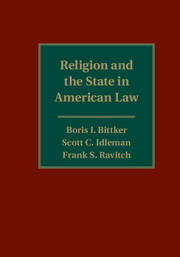Book contents
- Frontmatter
- Dedication
- Contents
- Preface
- 1 History and Introduction
- 2 Church and State in the Nineteenth Century
- 3 Religious Influences and Expressions in Law and Government
- 4 The Establishment Clause
- 5 The Free Exercise Clause
- 6 The Religious Test, Equal Protection, and Free Speech Clauses
- 7 The Definition of Religion
- 8 Church Property Disputes and Church Schisms
- 9 Contracts
- 10 Taxation
- 11 Employment
- 12 Land Use
- 13 Torts
- 14 Criminal Law and Process
- 15 Family Law
- 16 Public Education
- 17 Religious Symbolism on Government Property
- 18 Special Contexts: Prisons and the Military
- Appendix A Federal Constitutional Provisions
- Appendix B State Constitutional Provisions
- Appendix C Selected Federal Statutes 910
- Index
15 - Family Law
Published online by Cambridge University Press: 05 October 2015
- Frontmatter
- Dedication
- Contents
- Preface
- 1 History and Introduction
- 2 Church and State in the Nineteenth Century
- 3 Religious Influences and Expressions in Law and Government
- 4 The Establishment Clause
- 5 The Free Exercise Clause
- 6 The Religious Test, Equal Protection, and Free Speech Clauses
- 7 The Definition of Religion
- 8 Church Property Disputes and Church Schisms
- 9 Contracts
- 10 Taxation
- 11 Employment
- 12 Land Use
- 13 Torts
- 14 Criminal Law and Process
- 15 Family Law
- 16 Public Education
- 17 Religious Symbolism on Government Property
- 18 Special Contexts: Prisons and the Military
- Appendix A Federal Constitutional Provisions
- Appendix B State Constitutional Provisions
- Appendix C Selected Federal Statutes 910
- Index
Summary
This chapter examines key issues at the intersection of religion and family law. The chapter begins with a brief look at the states’ accommodation of religious choice in laws governing entry into marriage. Next, the chapter explores the rich topic of religion and custody of children, examining (1) the role of religion as a positive or negative factor in the choice of a primary custodian, (2) restrictions on a parent's behavior or time with the child for reasons related to religion, and (3) enforcement of parental agreements concerning the child's religious upbringing. The chapter then turns to adoption, examining religious matching laws and judicial inquiries into the religion of prospective adoptive parents. Finally, the chapter explores religious choices about divorce, in particular, the question of whether a civil court will enforce a religiously grounded marriage contract.
A. Entering Marriage: Solemnization
In the United States, marriage has always been the subject of civil authority. The state, rather than the church or the individual, controls access to and exit from the relationship. Marriage may begin with a private agreement, but this agreement gives way to a series of nonnegotiable terms imposed by the state. Simply put, marriage is a status arising from a contract. In an increasing number of instances, however, the state defers to private choices about marriage. A simple and long-standing example of this deference lies in state laws that give parties freedom to solemnize their marriage through a religious ceremony.
Every state permits religious solemnization of marriage. State statutes vary, however, in their willingness to defer to private choices about religious solemnization. Some statutes are quite broad, permitting solemnization, for example, “in accordance with any mode of solemnization recognized by any religious denomination.” Other statutes are more particularized, identifying specific religious faiths and religious officials who may solemnize a marriage. Some states permit solemnization in religious organizations that have no ministers or priests. Some statutes specify that the religious officiant must perform the ceremony in accord with religious rules or customs.
- Type
- Chapter
- Information
- Religion and the State in American Law , pp. 703 - 745Publisher: Cambridge University PressPrint publication year: 2015



